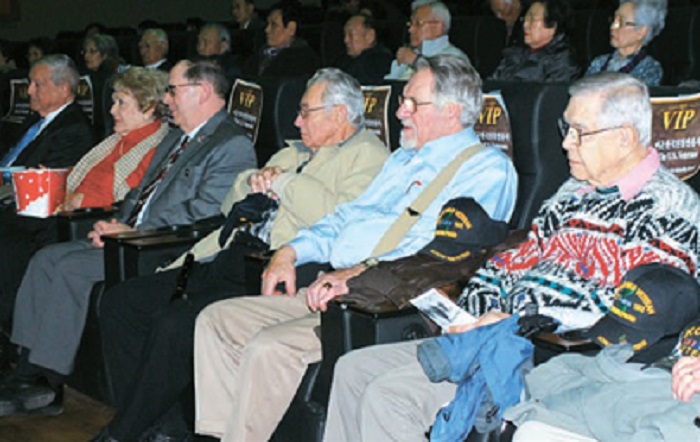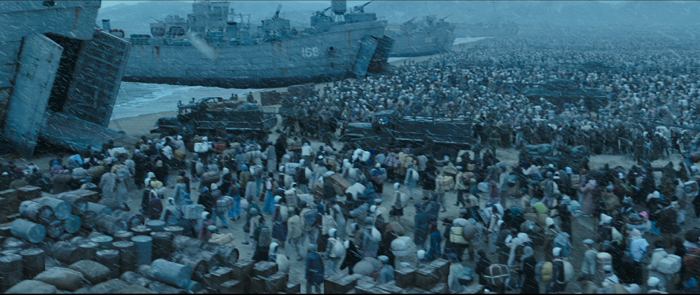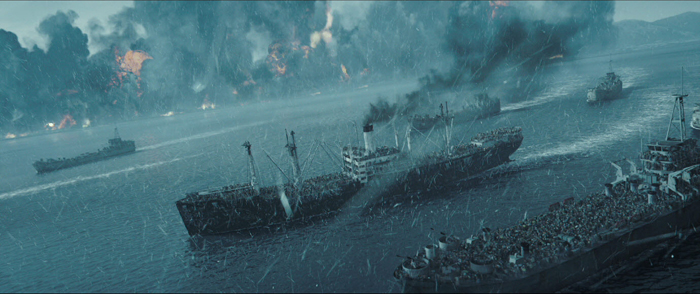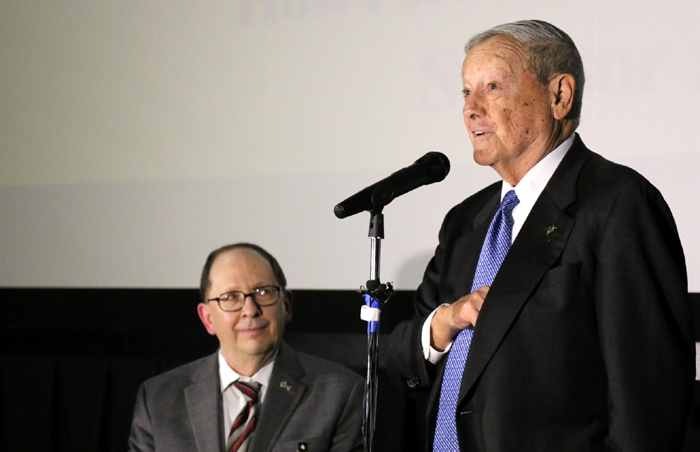The sounds were from about 50 or so grey-haired war veterans who fought for the U.S. during the Korean War (1950-53). At the theater, the veterans together watched the domestic mega-hit “Ode to My Father.” During the special screening, many scenes touched their hearts, reigniting vivid war memories from 65 years ago that they’ve had on their minds to this day.

Grey-haired Korean War veterans watch the movie 'Ode to My Father' at the Regal Theatre in Fairfax, Virginia, on February 11.
The veterans started sobbing at almost the beginning of the film, in particular when they saw the scene depicting the famous Heungnam Evacuation, the rapid evacuation of U.S. soldiers and civilian refugees that took place between December 15 and 24 in 1950, at Heungnam Port in Hamgyeongnam-do (South Hamgyeong Province), in northern Korea.
During the dramatic scene, in which young Deoksu, the lead male character, loses the hand of his younger sister, Maksoon, while they precariously climb up the rope net aside the SS Meredith Victory, there were deep sighs here and there from the audience.
The Heungnam Evacuation was a meaningful event of the Korean War. The retreating U.S. Army, facing formidable attacks by Chinese troops while operating at the front lines in northeastern Hamgyeongnam-do, decided to help evacuate 14,000 strugling evacuees from the area, letting them onboard the SS Meredith Victory.
Leaving the port on December 23, 1950, the ship travelled down past Busan on December 24 and arrived at Geojedo Island, Gyeongsangnam-do (South Gyeongsang Province), on December 25. That’s why the evacuation is often called the "Christmas Miracle."


A scene from the movie 'Ode to My Father' depicts the famous Heungnam Evacuation during the Korean War in which the U.S. Army abandoned its weapons and instead allowed more than 14,000 refugees onboard the SS Meredith Victory at Heungnam Port in Hamgyeongnam-do.
Retired U.S. Marine Corps Lieutenant General Stephen Olmstead, one of the veterans who attended the special screening, said that, “The Korean War is not a forgotten war, but a forgotten victory.”
“The separation of the family members during the evacuation depicted in this movie isn’t just a story of a family there, but is a story of us. I cried too,” he added, as tears welled up in his eyes. “This movie portrays so vividly the way in which people tried to survive at the quay, and also the way the warship, the troops and the military equipment moved. I cannot and will not forget the frigid cold that could freeze almost everything.”
Retired Colonel Thomas Ferguson was just as deeply moved as the others in the theater. Ferguson is the grandson of Edward Almond, the commander of the U.S. Army’s X Corps during the war who spearheaded the evacuation.
The SS Meredith Victory was a cargo freighter weighing 7,600 tons, which had a capacity of only 60 people at most. Captain Leonard LaRue called for all weapons on board to be thrown overboard and instead allowed as many refugees as it could accommodate on board. In the process, three U.S. soldiers were killed, defending the vessel at the rear.
The ship sailed for 28 hours down to Busan Port. During the voyage, those on board were short of food, water, blankets and medicine. Despite endless shelling from the enemy, there were no casualties.
It’s also known that the crew took off their clothes to save some women and children from the severe cold. When the ship arrived at Busan Port on December 24, the ship was not allowed to enter because it held too many refugees. The captain had no choice but to travel a further 80 kilometers and let the passengers off at the Jangseungpo Port off Geojedo Island on December 25.
During the voyage, five babies were born onboard.

Retired U.S. Marine Corps Lieutenant General Steven Olmstead (right) talks about his feelings after watching 'Ode to My Father' on February 11. Next to him is Colonel Thomas Ferguson, the grandson of the commander of the U.S. Army’s X Corps, Edward Almond, who helped evacuate refugees from Heungnam while under attack by the enemy during the Korean War. (photo: Yonhap News)
“When my grandfather talked about his experiences in three wars -- World War Ⅰ, World War Ⅱ and the Korean War -- he believed the Heungnam Evacuation was the most meaningful accomplishment among any other operation,” said Ferguson. “It’s safe to say that the Heungnam event is a miracle that made it possible to evacuate not only the U.S. troops, but also the Korean refugees.”
The veterans laughed together, watching the miraculous deeds that Korea achieved throughout the post-war 1960s and 1970s. They shed tears together at the same time as they saw Deoksu finally reuniting with his younger sister during the 1980s, who he thought was dead.
“This film allows us to figure out how Korea has come this far,” said another veteran. “I recommend that all U.S veterans of the Korean War watch this movie. They must feel proud, surely.”
By Sohn JiAe
Korea.net Staff Writer
Photos: CJ Entertainment
jiae5853@korea.kr